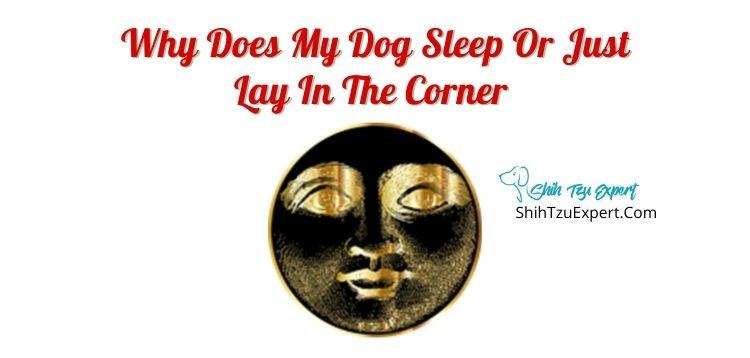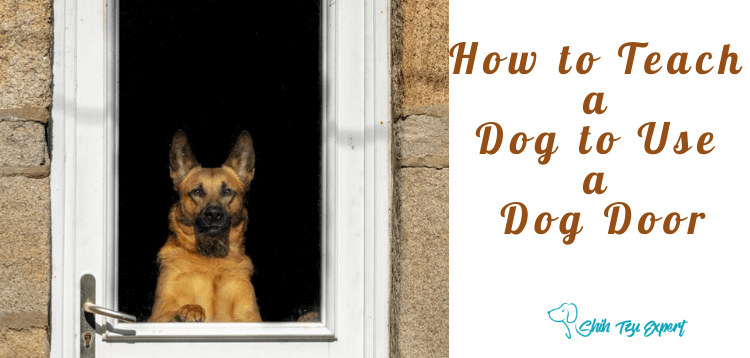Your dog may choose to lay or sleep in the corner for a variety of reasons. Most are mild, and a new bed or basic training can redirect them. In rare cases, this behavior may indicate a larger health problem.
Why Does My Dog Sleep Or Just Lay In The Corner?
Dog owners strive to provide the best place to sleep for their canine companions, so it’s perplexing when your dog prefers a spot on the floor. There are several possible reasons for this behavior, and you can try a variety of strategies to encourage your dog to sleep elsewhere.

Why Does Your Dog Sleep Or Just Lay In The Corner (All Of Sudden)?
Your Dog Hates Its Bed (Because It’s Uncomfortable, Rough, Too Small, Old, Smelly)
It happens all the time: we spend a lot of money on a new bed for our pets, but they refuse to sleep there! If the bed is brand new, it may take some time for your dog to warm up to it. Encouragement with praise and treats can help.
Dogs also prefer beds that match their body size. It may be obvious that a large dog needs a bed big enough to prevent his head and legs from hanging over the side. But what about small dogs? They prefer beds that aren’t too big, so they feel snug and secure.
Like humans, dogs prefer beds that are comfortable and clean. If your current dog bed is dirty, worn out, or uncomfortable, don’t be surprised if your dog finds a cozier spot elsewhere!
The Corner Is Far More Comfortable Than The Alternatives
The position of the bed matters, too. Dogs prefer to sleep near their owners. If her bed is too far away from you, your dog may choose a closer spot, even if it’s on the floor.
There are many other factors that could make the floor more appealing, for example:
The Corner Feels Safe And Secure
Dogs sleep a lot, and in shorter bursts than humans, so they need a sleeping place that is quiet and free of distractions to get the best rest. If your dog’s bed is in a place with lots of activity or loud noise, he may seek out a quieter spot with more personal space.
Dogs also feel secure in corners because they can see the rest of the room and no one can sneak up on them. Having the wall at their back gives them a feeling of safety.
The Corner Is Nice And Dark
Like people, dogs sleep better when it’s dark. Leaving a lamp on at night near your dog’s bed can prevent her from falling asleep, so she might seek out a darker spot.
The Corner Is Nice And Cool
During warm weather, fluffy dog beds could make your dog feel too hot. Hard floors such as wood, tile, or linoleum will feel cooler than your dog’s bed, so he may choose to sleep on the floor instead.
The reverse is true in winter. Your dog may find the corner is cozy because it’s near a heater, and decide to sleep there instead of in her bed.
The Corner Smells Better Than Other Places
Dogs are attracted to certain smells, especially the smell of their owners. If you leave your slippers, unwashed clothes, or other things that smell like you in the corner, your dog may gravitate toward that spot.
When your dog is home alone, he may feel comforted sleeping someplace that smells like you.
The Corner Is A New Experience / Environment
If you just got your dog or moved to a new house, he may not feel comfortable in the new environment yet. Lying in the corner gives your dog a vantage point over the new space from a distance and helps him gradually adjust.
The Corner Is Where The Toys Are!
Many owners gather their dog toys all in one area, and a corner of your living room is as good a place as any! Your dog may gravitate toward this area, especially if she is bored. She may start playing with one of her toys and eventually doze off in place.
When you’re away from home, sleeping near her toys may also help comfort your dog.
The Corner Is Simply Where Your Dog Likes To Sleep
Not all dogs have formed a habit of sleeping in a bed. Dogs adopted from shelters may have never slept in a dog bed before and may retain a preference for sleeping on the floor.
Ultimately, dogs will naturally choose the sleeping space that’s most comfortable for them. As long as your dog is sleeping well, you don’t need to worry too much even if the location seems strange.
Dog Feels Threatened Or Anxious
Sleeping and hiding are two different things. If your dog is hiding in the corner acting fearful, something has likely scared your dog. Common sources of fear in dogs include:
- Loud noises
- New people
- Being in a new environment
This behavior is common in puppies, as they are still learning to adjust to their new home.
Dogs are also very sensitive to human emotions. If you are feeling anxious or upset, your dog may seek a secure space because she feels stressed.
Dog Is Getting Old
Age could also be a factor. As dogs get older, their behavior patterns change, including their sleep cycles. Your dog may suddenly feel tired and lie down wherever he is. If his bed is upstairs, he may not always have enough energy to climb up to it.
Your dog could also be experiencing memory loss, forgetting where her bed is located. It’s important to keep your dog’s bed in a single location to help avoid this issue.
Senior dogs can benefit from a firm bed that supports their joints, reducing pain and helping them to sleep better. If their bed is too squishy, senior dogs may prefer a carpeted floor that provides more support.
You Have Inadvertently Rewarded Your Dog For Sleeping In The Corner
When your dog chooses to sleep in a strange place, you might worry and try to comfort her with attention or treats. However, giving those rewards while your dog is in that location may encourage her to keep sleeping there.
Reward your dog with treats when she lays down in her bed, rather than in the corner.
What To Do If Your Dog Sleeps Or Just Lays In The Corner?
Find Out The Reason Why Your Dog Is Sleeping In The Corner
If your dog suddenly started spending more time in the corner, think back to what happened right before the behavior started. Were new people visiting your home? Did loud construction start on your street? These could make your dog anxious and drive her to seek a quieter sleeping spot.
Determining the reason for the behavior will help you pinpoint a solution.
If You Want The Dog To Sleep Elsewhere Make That Place More Attractive Than The Corner
Make sure the location you’ve chosen for your dog’s sleeping place is quiet and secure. It should be away from centers of loud activity, but close to where you spend most of your time. If your dog is especially anxious, a crate may be a good option to help her feel secure.
The location should also be a comfortable temperature: warm in winter and cool in summer.
If your dog has a favorite blanket or pillow, try lining her bed or sleeping spot with those items to encourage your dog to sleep there. You can also try placing a favorite toy or something that smells like you nearby.
If They Don’t Like The Bed, Get Them A Better Bed
If you’ve tried rewarding your dog for sleeping in their bed but he still prefers to sleep elsewhere, it may be time for a new bed. A mesh bed can be a good option for dogs who gravitate toward cool floors. The mesh allows air to circulate freely, keeping your dog cool while he sleeps.
Also, choose a bed that’s just the right size. Observe the way your dog likes to sleep and maybe take a few measurements. Then select a bed that’s slightly larger than those dimensions.
Finally, select a machine-washable bed and wash it once a week to keep it smelling fresh.
How To Discourage The Dog From Sleeping In The Corner
The best way to discourage your dog from many types of undesirable behavior is to give her an alternative. In this case, give your dog a different (and hopefully better) place to sleep, and reward her with praise and treats for sitting or lying on it.
Then, the next time you notice your dog settling down in the corner to play with a toy alone, call her outside to play. Make sure she knows there are places to play besides the corner. You may also want to store her toys somewhere else.
Keep in mind, punishing your dog likely won’t work. She won’t understand what she’s doing wrong.
If All Else Fails Consult The Vet
Check with your vet if this behavior comes up suddenly and continues for a while, especially if you detect any signs of health problems. Does your dog have difficulty standing, sitting, getting up, or jumping? These could be symptoms of a larger problem your vet should investigate.
How To Find Out What Is Making The Dog Anxious And Address Those Issues?

Dogs typically display anxious behavior out of fear. Your dog may be spending time in the corner to get away from something he is afraid of, like loud noises or new people.
It’s usually easy to tell when dogs are feeling anxious. They display behaviors like tail-tucking, shivering, hiding, excessive panting, pacing, or vocalizations like barking or crying. In more severe instances, your dog may destroy things or urinate or defecate in the house.
If you can pinpoint the cause of your dog’s anxiety, you can work on desensitizing him to that stimulus. Repeatedly expose your dog to the stimulus at a low enough intensity that he does not respond with fearful behavior. Reward him and slowly work up to full exposure.
Alternatively, you can counter-condition your dog to display a different, positive behavior instead of anxiety.
For example, you can practice the sit-stay command, and reward your dog with treats. The next time she encounters something that scares her, ask her to sit and stay. This will direct her attention away from the negative stimulus, and towards something she associates with treats.
Do not punish your dog for anxious behavior, as this will make the behavior worse.
When Should I Worry About My Dog Sleeping In The Corner?
Usually, sleeping in the corner is not a reason for concern by itself. You should only worry if it seems like something else is going on. For example, if your dog is also showing signs of discomfort or her mobility has decreased, you may want to check with your vet.
Another cause for concern would be a lack of interest in things your dog used to enjoy, such as toys, treats, or spending time with you. This could also be a sign of an underlying medical problem your vet should investigate.
If your dog displays none of these signs, it’s possible he simply prefers the corner. Try not to take it personally!
References:
The Importance of a Good Dog Bed
https://www.petmd.com/dog/conditions/behavioral/c_dg_fears_phobia_anxiety


![12 Best Dog Foods for Toy Breeds [Buyer's Guide] 12 Best Dog Foods for Toy Breeds [Buyer's Guide]](https://shihtzuexpert.com/wp-content/uploads/2019/05/3-5.jpg)

